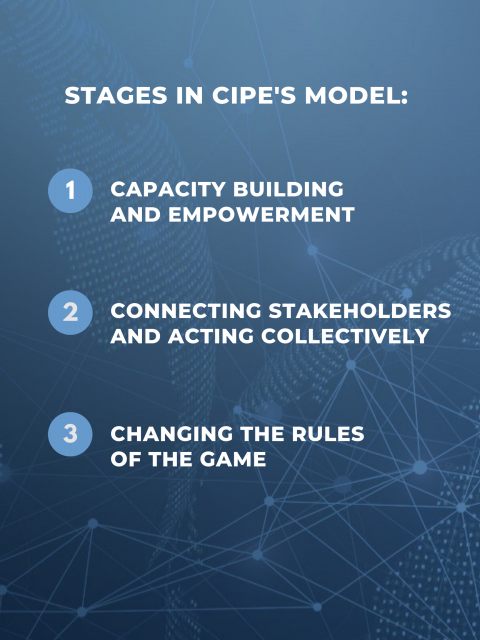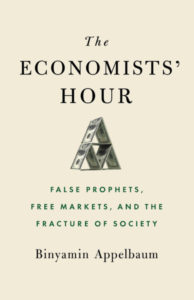
Societies with open markets and the rule of law foster freedom and security, allowing businesses to innovate and invest, notes Kim Bettcher, head of the Center for International Private Enterprise’s (CIPE – a core institute of the National Endowment for Democracy) knowledge management initiative.
CIPE aims to improve the operating environment for businesses by building the institutions of a market economy, reducing barriers to doing business, and promoting an inclusive entrepreneurial culture, he writes:
Deciding where and how to engage the private sector can seem a daunting task. However, if one conceives of engagement as preparing and mobilizing the private sector to change the rules of the game, this helps to structure choices regarding modes of engagement, scaling, inclusion, and sustainability. The model is adaptable and can be applied to multiple problems—local or industry-wide, public or private—so long as the private sector has a stake in them. In fact, CIPE’s approach should be seen as complementary to other approaches to engagement.
Whether the goal is to mobilize resources, support social innovation, or change behaviors, harnessing collective action by the private sector to change the playing field can alter the equation for the better, Bettcher concludes.
 Such a nuanced, multi-dimensional approach is more conducive to sustainable democratic governance than the fetishization of markets highlighted in The Economists’ Hour by Binyamin Appelbaum, which considers the outsized role that economists came to play in shaping public policy.
Such a nuanced, multi-dimensional approach is more conducive to sustainable democratic governance than the fetishization of markets highlighted in The Economists’ Hour by Binyamin Appelbaum, which considers the outsized role that economists came to play in shaping public policy.
As a result, rising inequality is straining the health of liberal democracy, he writes for The New York Times:
The idea of “we the people” is fading because, in this era of yawning inequality, there is less we share in common. As a result, it is harder to build support for the kinds of policies necessary to deliver broad-based prosperity in the long term, like public investment in education and infrastructure….Willful indifference to the distribution of prosperity over the last half century is an important reason the very survival of liberal democracy is now being tested by nationalist demagogues.
Appelbaum draws a line from a misguided faith in “free” markets right to current political failures — soaring inequality, the rise in populist nationalism, declining faith in liberal democracy, the Post’s Greg Sargent adds.
“We don’t get the growth we were promised. The basic idea that this is going to work to deliver prosperity doesn’t happen. What we get instead is huge inequality,” says Appelbaum:
One very important consequence is that it makes it much harder to have democracy. You get this bifurcation where the interests of the poor and the rich are very different, and the middle class is shrinking. The result is that the ability for the populace to govern itself in its collective interest is really eroded.
Private Sector Ideas for Fighting Corruption in Latin America: AS/COA’s Anticorruption Working Group convened a meeting of senior private sector leaders to discuss practical steps for reducing corruption in the region. Read the report.







